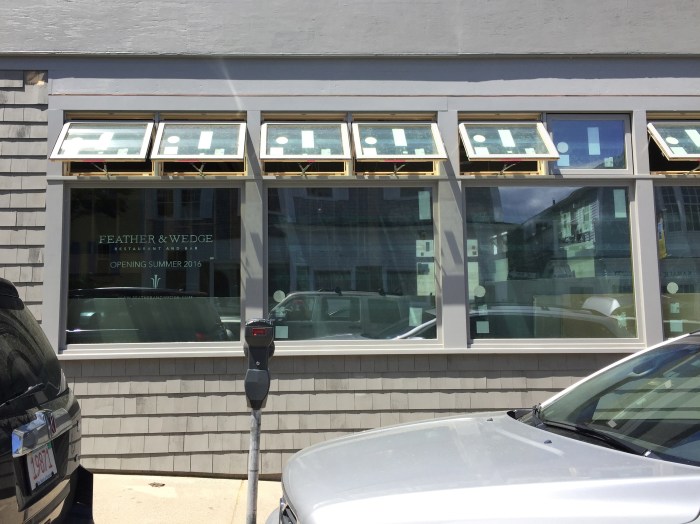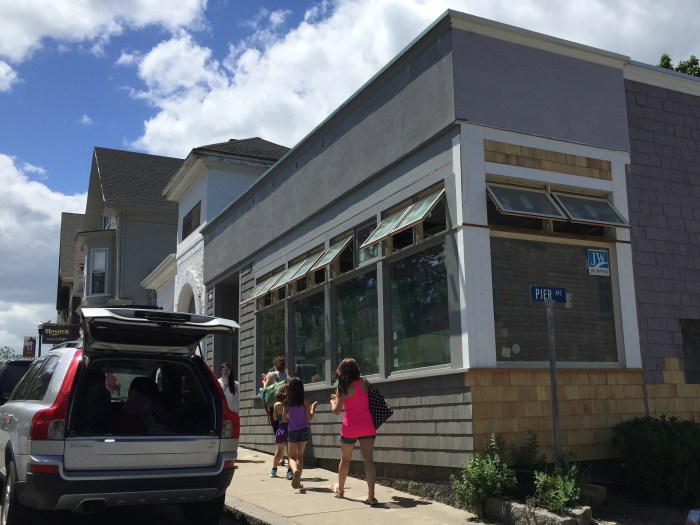We mentioned the other day on the most recent podcast (from the gorgeous new Beauport Hotel) that a new restaurant is coming to Rockport.
The Feather & Wedge Restaurant and Bar (happy dance) is scheduled to open sometime this summer. I honestly don’t know a thing about it. Who can fill us in? I’d love to know more!



http://www.gloucestertimes.com/news/local_news/feather-wedge-readies-for-summer-opening/article_6a5a34ef-c3b9-5b1f-a605-ed07c20a9226.html
LikeLiked by 1 person
Looks like you found the answer and I remember folks from Rockport had to come to Lanesville or Gloucester for the Liquor…:-O
Source: http://www.seecapeann.com/see_rockport.html
Fiddlers Green – Irish Song
https://www.youtube.com/watch?v=zviVCHO2_8k (Lyrics in the song) 🙂
Why Rockport Was A “Dry” Town For So Long
In the spring of 2005, the citizens of Rockport voted to allow alcoholic beverages to be sold in restaurants. For many prior years Rockport held the unusual distinction of being a “dry” town, that is, a town in which liquor is not sold. The story of how this came to pass is well known in Rockport, and, ironically, there has been a restaurant named for the person most responsible for this interesting piece of history that has influenced life in this small town substantially for almost 1-1/2 centuries.
Hannah Jumper
It was on July 8, 1856 that Hannah Jumper led her now-famous “Women’s Raid.” Gathering at Dock Square during the morning hours, Hannah was joined by two men, one carrying An American flag, the other a temperance banner, along with the women of the town, who were armed with hatchets. They proceeded to raid all the shops and even some private homes where liquor was kept, emptying and smashing all the bottles, casks, demijohns and jugs. The gutters ran with liquor.
A series of events helped set off the Women’s Raid. 1856 was an election year, and with the campaign came new ideas. Thoreau’s Walden was slowly being circulated and its ideas accepted. The Women’s Movement was getting underway. Emerson was encouraging the abolishment of slavery. And a group known as the Temperance Movement, aimed at abolishing the sale and use of liquor, was also formed.
The men of Rockport were spending large portions of their earnings on rum.
They said rum was as much a part of fishing as bait. Still, the $157 each fisherman brought home at the end of nine months of fishing was not enough to feed a family. In an era when a pound of flour cost $10, the men were spending 1 3/8 cents for a drink of rum. During the years 1852 to 1856 the sale of rum rose 250 percent.
For the spinster Hannah Jumper, a seamstress by trade, the time had come to change things. Too much of the family money was going toward the purchase of rum. Hannah hoped the town meeting of March 1856 would curb liquor sales and consumption. A committee had been set up to enforce the state law of 1814, which ruled each town could regulate the sale of liquor. But sales and consumption continued to rise and Hannah vowed to take action.
Hannah formed a group to help with her plan. They first met at 48 Main Street, the home of Rachel and Steven Perkins. Determined to find out where every drop of liquor was stored or sold, they enlisted all the women and any men that they could, to raid the town. A decision was made to end up at Dock Square. There were two reasons for this: first, it was the site where the town’s fishermen distributed “free likker” to the town’s idlers a year earlier; second, Dock Square was the place where the annual Fourth of July party was held. It was always a raucous event, and the committee of agents appointed to control the liquor consumption let the affair get out of hand, year in and year out.
The raid was carried out. The women marched along Main Street, finishing their reign of terror in five hours. They arrived at Dock Square triumphant.
Jim Brown, the store owner most damaged by the tirade, took the women to court on the charges of breaking and entering and destruction of property. The women were eventually acquitted of all charges.
Until 1966, Rockport residents voted on the issue of the sale of liquor in every general election. In that year, the state laws regarding the sale of liquor were amended. The new law stated that if the liquor issue were voted on in the affirmative or the negative in three consecutive elections, then the issue would be dropped from the ballot.
In 1966, 1968 and 1970, Rockport residents voted against the sale of liquor in their community. A petition with 10 percent of registered voters is required before a referendum can be placed on the ballot. Such a referendum was held in 1998, and was defeated. In 2005 it was approved.
LikeLike